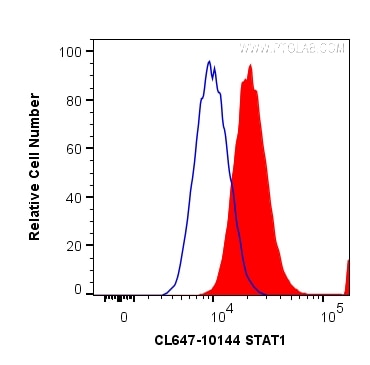- Phare
- Validé par KD/KO
Anticorps Polyclonal de lapin anti-STAT1
STAT1 Polyclonal Antibody for FC (Intra)
Hôte / Isotype
Lapin / IgG
Réactivité testée
Humain, rat
Applications
FC (Intra)
Conjugaison
CoraLite® Plus 647 Fluorescent Dye
N° de cat : CL647-10144
Synonymes
Galerie de données de validation
Applications testées
| Résultats positifs en FC (Intra) | cellules HepG2 |
| Résultats positifs en cytométrie | cellules HepG2 |
Dilution recommandée
| Application | Dilution |
|---|---|
| Flow Cytometry (FC) (INTRA) | FC (INTRA) : 0.20 ug per 10^6 cells in a 100 µl suspension |
| Flow Cytometry (FC) | FC : 0.20 ug per 10^6 cells in a 100 µl suspension |
| It is recommended that this reagent should be titrated in each testing system to obtain optimal results. | |
| Sample-dependent, check data in validation data gallery | |
Informations sur le produit
CL647-10144 cible STAT1 dans les applications de FC (Intra) et montre une réactivité avec des échantillons Humain, rat
| Réactivité | Humain, rat |
| Hôte / Isotype | Lapin / IgG |
| Clonalité | Polyclonal |
| Type | Anticorps |
| Immunogène | STAT1 Protéine recombinante Ag0199 |
| Nom complet | signal transducer and activator of transcription 1, 91kDa |
| Masse moléculaire calculée | 83 kDa |
| Poids moléculaire observé | 84 kDa |
| Numéro d’acquisition GenBank | BC002704 |
| Symbole du gène | STAT1 |
| Identification du gène (NCBI) | 6772 |
| Conjugaison | CoraLite® Plus 647 Fluorescent Dye |
| Excitation/Emission maxima wavelengths | 654 nm / 674 nm |
| Forme | Liquide |
| Méthode de purification | Purification par affinité contre l'antigène |
| Tampon de stockage | PBS with 50% glycerol, 0.05% Proclin300, 0.5% BSA |
| Conditions de stockage | Stocker à -20 °C. Éviter toute exposition à la lumière. Stable pendant un an après l'expédition. L'aliquotage n'est pas nécessaire pour le stockage à -20oC Les 20ul contiennent 0,1% de BSA. |
Informations générales
What is the molecular weight of STAT1? Are there any isoforms of STAT1? Is STAT1 post-translationally modified?
The molecular weight of STAT1 is 91 kDa for full-length STAT1α and 84 kDa for STAT1β, which is devoid of the C-terminal activation domain (PMID: 1502203). Phosphorylation of STAT1 regulates STAT1 activity. Phosphorylation of Tyr701 by Janus kinases (JAKs) triggers STAT1 homo- and hetero-dimerization with other STAT family members and also causes nuclear translocation, while phosphorylation of Ser727 is needed for full activation (PMID: 10851062). STAT1β lacks Ser727 and has therefore been considered to be inactive or acting in a dominant negative manner to STAT1α, although it has been further shown to be capable of transcription activation in vivo (PMID: 24710278).
What is the subcellular localization of STAT1?
STAT1 is present in the cytoplasm and in the nucleus. Translocation of STAT1 from the cytoplasm to the nucleus is required for its regulation of gene expression and is dependent on phosphorylation (see above). However, low levels of unphosphorylated STAT1, often referred to as U-STAT1, can also be found in the nucleus, where U-STAT1 regulates the stability of heterochromatin by binding to chromatin in monomeric or dimeric states (PMID: 18840523).
What is the tissue expression pattern of STAT1?
STAT1 is ubiquitously expressed.
Protocole
| Product Specific Protocols | |
|---|---|
| FC protocol for CL Plus 647 STAT1 antibody CL647-10144 | Download protocol |
| Standard Protocols | |
|---|---|
| Click here to view our Standard Protocols |


